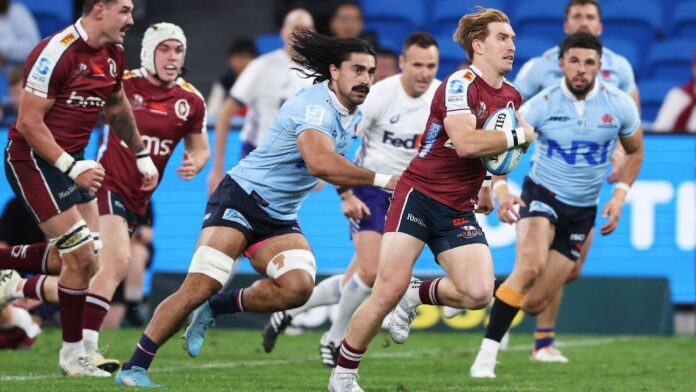
[ad_1]
Sam BruceFeb 2, 2025, 11:25 PM ET
CloseSam was brought up on long drives and the dusty fields of north-west New South Wales, where he developed his love of rugby from an early age. He joined ESPN after a five-year stint heading up Fox Sports Australia’s digital rugby coverage.
Late last week, the host cities for Rugby World Cup 2027 were unveiled in Sydney. Meanwhile in the background, the Australian rugby community is eagerly awaiting news of Joe Schmidt’s future, a future that may or may not exist beyond this year’s British & Irish Lions series, a one-in12-year event Down Under.
Spare a thought then for the organisers of Super Rugby Pacific [SRP], who despite beating the NRL and AFL to the winter-codes kick-off by a few weeks, are being virtually overshadowed by their own sport, right at the very moment when it should be publicizing yet another competition restructure.
With the Melbourne Rebels having been wound up after dire financial mismanagement – the franchise had debts owing in excess of $22m – Super Rugby Pacific will this year operate as an 11-team, 16-round competition. The hope is that the compression of talent in Australia should result in improved competition from the country’s four remaining franchises.
And while greater week-to-week competition jeopardy would indeed improve what has become an ailing Super Rugby narrative – so too greater trans-Tasman competition – the search for a tournament identity goes on.
How do Australia and New Zealand build Super Rugby up to be its own engaging, tribalistic rugby tournament, the kind of which was synonymous with Super 12 back at the turn of the millennium, and not have it merely be a week-to-week discussion about who should be running out for the Wallabies and All Blacks?
It is effectively a rugby equivalent of the separation of church and state.
At long last, however, SRP has its own board — albeit on which chief executives of New Zealand Rugby [NZR] and Rugby Australia [RA], Mark Robinson and Phil Waugh, sit – and its own chief executive in Jack Mesley.
“When it comes to Super Rugby, the competition owners, NZR and RA, want to grow Super Rugby,” Mesley told a small group of Australian reporters in late September last year.
Queensland Reds and NSW Waratahs need to perform if Super Rugby Pacific is to engage a broader audience Matt King/Getty Images
“In all of the meetings that I am sitting in, either at board level or a management level, the relationship’s nothing but constructive, and everyone wants the best for Super Rugby because they understand how they will benefit from that but also how that will fuel the broader rugby pyramid in each country and it’s the same with the Pacific nations as well.”
Mesley took on the job as SRP supremo at a challenging time. As well as the axing of Melbourne Rebels, both RA and NZR are engaged in broadcast negotiations for the next five-year period, of which SRP forms a critical part, while rugby’s broader obstacles are well known; a complicated lawbook, player wage imbalance, and the pursuit of a more aligned global calendar to name a few.
The Australian can have little impact on that, though, and perhaps one of the positives of his new role is that his SRP will be largely local, save for some discussions around potential expansion or crossover/champions league style games with Japanese leagues.
Mesley had already narrowed the focus after taking on the role, and the chief executive feels as though there is some low hanging fruit he could pluck for a competition that had already “increased attendances by 7% in 2024”.
“There’s so much opportunity. If you’re looking at other [things], like for us just to do simple things well, like greater transparency around judiciary, I know [there is a push] for live blogging out of it, things like that present a whole lot of opportunity for us. And that’s what I’m excited by, is that, just those things which should be, in my view, base camp, are relatively easy to attain. So let’s get to there as quickly as we can, and then let’s go from there.
“Our communications ecosystem is a really important one, you know, what are we scared of that we need to really jump into? We need to be more transparent, we need to give you guys [the media] more access, we need our broadcast partners to have all the access they need come next day… so we’ve got to get that right, and we’ve got to put in the right policy and procedure to enable that and make sure everyone’s comfortable with that.
Queensland Reds and NSW Waratahs need to perform if Super Rugby Pacific is to engage a broader audience Matt King/Getty Images
“I think there’s probably 15 of those [little things] that if we can quickly get to, okay, we’ll be at an elevated level. And then we, you know, we can continue to push from there.”
To their credit, Australia’s four Super Rugby franchises either are, or are in the process of, facilitating open media days, where every member of the squad is available for interview. It is the same story in New Zealand, with the Crusaders opening their squad later this week.
But even before the SRP season has begun, much of the coverage has, naturally, turned to the uncertainty around Schmidt’s position, how it may affect a player’s own longer-term future; the media event to announce the 2027 RWC host cities only adding further shade.
And once the season gets underway, the challenge for Mesley and his broader SRP administrators, and the management teams of the four Australian franchises, will be trying to keep the focus on the competition itself, rather how the Wallabies might line up against the Lions come July – or what the collective trans-Tasman head-to-head tally might be reading.
“The other observation that I’ve had, as to what are some of the easier wins is celebrating the competition as an 11-10 competition, not a competition between Australian sides and New Zealand sides,” Mesley said.
Rieko Ioane celebrates the Blues’ 2024 Super Rugby Pacific title win after they defeated the Chiefs in the final MICHAEL BRADLEY/AFP via Getty Images
“And so it is nuanced, but I think we would be surprised at what it does, what it unlocks in driving this through the club lens. So, for too long as an outsider, the narrative has been how the Australian teams are doing. It’s taking away from; how the Brumbies are doing, and what have they got coming up, and what is the interest in their playing roster and their playing style as they’re playing against the Waratahs this week or whatever that might be.
“So really celebrating this competition as one competition with 11 teams from very diverse backgrounds that celebrate different cultures, celebrate the communities they’re from, rather than generalising this up to Australian teams versus New Zealand teams. All of the colour is lost. All of the interest is lost.
“It doesn’t enable us to celebrate the difference between the Reds and the Force, or the Force and the Brumbies, or indeed, how the wonderful Fijian Drua and the colour and atmosphere that those clubs bring. So for me that is a really big push.”
SRP will officially launch in Sydney this weekend, with players from all 11 teams to take part in a photo shoot by the Pacific Ocean, before they are made available to the media.
The Waratahs’ prized recruit Joseph-Aukuso Suaalii will be on deck, after he sat out NSW’s trial match with the Brumbies as a precaution. Beauden Barrett will represent the Blues after his return from a Japanese sabbatical last season, just as his little brother Jordie enjoys his own overseas stint with Leinster in Ireland.
The other big offseason switch was Ardie Savea’s return not to the Hurricanes, but to Moana Pasifika where he will once again line up alongside his brother, Julian. Savea’s move to Moana after a sabbatical of his own makes the expansion franchise, now into its fourth season, immediately stronger, so much so that they should be challenging for a finals berth.
The new-look six-team playoffs system meanwhile should also no longer reward mediocrity like its former eight-team postseason setup while, from an Australian perspective, the competition is begging for one of the Reds, Waratahs, Brumbies or Force to make a deep finals run.
“We did a lot of investigation into looking at different structures of final series with 16s. And we’ve ended up with that approach that we have. And what we’re super excited by that finals format is that we think it’s going to drive real interest in those final couple of rounds, because not only of who is going to be the minor premier, but also who’s the last spot into the finals, who’s coming sixth, that battle for sixth.
Editor’s Picks


1 Related
“The rankings all the way through 1-6 matter when it comes into the first week of the finals, so we think that’s going to provide a lot of intrigue and interest.”
A return to 12 teams remains a very real option for Super Rugby in the future, with Mesley admitting that 11 is not an ideal number. Japan remains the most logical choice given its proximity, but convincing what is becoming an increasingly competitive Japanese League to split is likely to prove a challenging task.
And so, for the time being, SRP must consolidate the tenuous footholds it has struck in its three years of existence. Competitiveness, tribalism and homing in on the existing rivalries are non-negotiables; if the competition can achieve that, then asking people to view it through the lense of provincial rugby first, and Wallabies and All Blacks second, might become more a reality.
And having its own independent board should certainly help, too, even if Mesley’s challenge is daunting and largely unlike any other in the Australian and New Zealand markets.
“Absolutely standing on its own. I mean, the defined purpose that the board has landed on is to light the flame for generations to light the flame,” Mesley said when asked about Super Rugby Pacific’s mission statement. “And under that, our vision is to be the number one rugby club competition in the world.
“So those two things are very clear to the unions, to the board. Super Rugby is not just a development pathway. It needs to be a lot more, and it is a lot more.”
[ad_2]
Copyright for syndicated content belongs to the linked Source link

